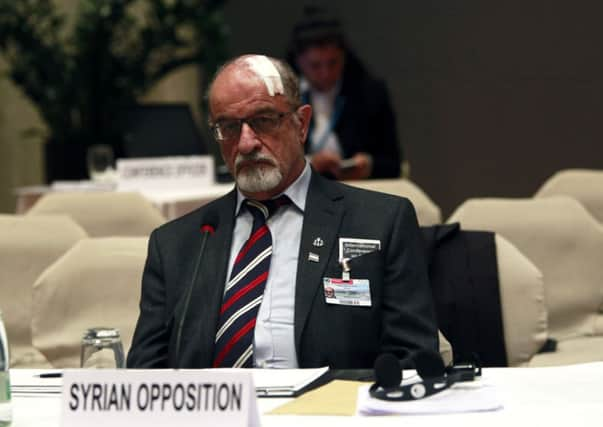Mutual hostility greets start of Syria peace talks


Opposition leader Ahmed Jarba accused Syrian president Bashar al-Assad of Nazi-style war crimes and demanded that the Syrian government delegation at yesterday’s one-day meeting in Switzerland sign up to an international plan for handing over power.
Syrian foreign minister Walid al-Moualem insisted Mr Assad would not bow to outside demands, graphically describing what he called atrocities of the “terrorists” – rebels supported by the Arab and western states which were present in the room.
Advertisement
Hide AdAdvertisement
Hide AdOn the eve of the talks a report co-authored by Scottish scientist Professor Sue Black, a forensic anthropologist at Dundee University, revealed details of around 55,000 Syrian government photos taken to record the deaths of torture victims.
The pictures came to light following the defection of a military policeman whose job was to take photos of the corpses.The United States and Russia, co-sponsors of the conference which UN officials hope will lead to more formal negotiations in Geneva from tomorrow, also revealed their differences over Mr Assad during formal presentations on Lake Geneva.
The talks reflect global concern that a civil war which has killed more than 130,000 and made millions homeless is spilling beyond Syria and encouraging sectarian militancy abroad.
There was little sign that any party was ready to make concessions at the meeting.
Mr Moualem called on foreign powers to stop “supporting terrorism” and to lift sanctions.
Referring to rebel acts, he said: “In Syria, the wombs of pregnant women are cut open, the foetuses are killed. Women are raped, dead or alive. Men are slaughtered in front of their children in the name of the revolution.”
He insisted Mr Assad’s future was not in question, saying: “Nobody in this world has a right to withdraw legitimacy from a president or government, other than the Syrians themselves.”
Western officials were taken aback by the combative tone of Mr Moualem, who defied UN secretary-general Ban Ki-moon’s plea to shorten his speech in angry exchanges.
Advertisement
Hide AdAdvertisement
Hide Ad“Hope exists but it’s fragile. We must continue because the solution to this terrible Syrian conflict is political and needs us to continue discussions,” said French foreign minister Laurent Fabius. “Obviously when we hear Bashar al-Assad’s representative, whose tone is radically different, we know it will be difficult.”
US secretary of state John Kerry echoed the rebel view that there is “no way” Mr Assad can remain under the terms of a 2012 international accord urging an interim coalition. But Russian foreign minister Sergei Lavrov said all sides had a role and condemned “one-sided interpretations” of the 2012 pact.
Saudi Arabia, which backs the Sunni rebels, called for Iran and its Lebanese ally Hezbollah to withdraw forces from Syria. Iran, locked in a sectarian confrontation across the region, was absent, shunned by the opposition and the west for rejecting calls for a transitional government.
The conference raised no great expectations, particularly among Islamist rebels who have branded western-backed opposition leaders traitors for even taking part. But even western officials said hopes of talks in Geneva tomorrow and beyond may be in jeopardy: “It’s very far from encouraging,” said a French diplomatic source. “We have the impression the regime has come to Geneva to ensure it fails.”
UN chief Mr Ban opened proceedings by calling for immediate access for humanitarian aid convoys to areas under siege.
“After nearly three painful years of conflict and suffering in Syria, today is a day of fragile but real hope,” he said.
But there was little sign of compromise on the central issue of whether Mr Assad, who inherited power from his father 14 years ago, should make way for a government of national unity.
While delegates sat in Montreux, the war went on in Syria, with reports of clashes and air strikes. Near Damascus, government artillery hit villages and rebels clashed with the army in Jobar on the north-east fringe of the capital, it said.
Advertisement
Hide AdAdvertisement
Hide AdIn Damascus, where life limps on amid bombardments and checkpoints, weary residents cautiously hope for better. “I really don’t think much will come out of it, but the alternative is no talks at all, and that’s not much better,” said mother of two Ruba.
SEE ALSO